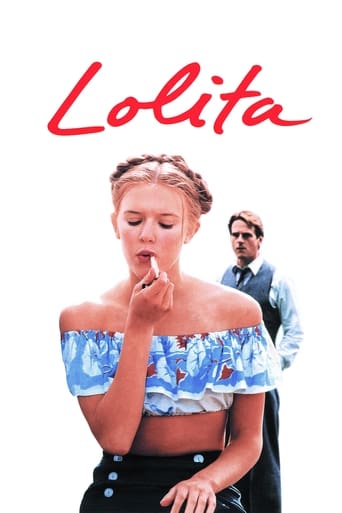Lwchapelhill
I've read the book, twice, and seen the Kubrick movie twice and Adrian Lyne's new version is the hands-down winner. The casting, the photography, and the production values are amazing. Kubrick's version, released in 1962, was plainly nervous about the subject matter, and to offset that nervousness, cast the most charming leading man of the day, James Mason, and for Lolita, the junior sexpot Sue Lyon. Peter Sellers' manic delivery of his lines eliminated the sinister aspects of the character of Clare Quilty, and various comic moments kept the movie from being dark or obsessive. But Lyne is not a man to shy away from the dark or obsessive. Having directed Fatal Attraction and 9 ½ Weeks, Lyne understands the dark and obsessive side of love and sex. It's interesting that in his Lolita, he keeps his understanding of the dark and obsessive as the keynote, but adds sunlight, beauty, and humor (a more sophisticated humor than Kubrick's). This dynamic works beautifully. Jeremy Irons adds a guilty edginess to many of his scenes, as when the headmistress of Dolores' school hems and haws about Dolores' understanding of sex. Irons, as the incestuous step-father, is plainly waiting to be denounced as a monster, as he assumes this conversation has resulted from Dolores telling someone about their illicit relationship. The headmistress fusses a bit more, then comes out with "Mr. Humbert, someone needs to tell that girl the facts of life!" Irons' agonizing tension and fear, followed quickly by incredulity and relief, is masterfully done. There are many scenes that play out as they did in the book, and the small additions where Lyne has diverged from the book enhances the scenes with rich detail and beauty. The scene on the porch of the Haze house, with Humbert, Dolores, and Mrs. Haze, is wonderfully choreographed, and Swain, as Lolita, is believably kid-like, yet sensual. Her sensuality is a new toy, something to experiment with now and then. Though it's not in the book, Dolores' tossing her retainer into Humbert's drink, then Humbert trying to conceal this from "Mama Haze," is a terrific addition. Playfulness, sensuality, and concealment of a guilty secret all work to set the tone of the first half of the movie. Dolores, becoming a young woman, plays with sexuality and sensuality, but has a child's understanding of adult relations. When she's done playing with sensuality, she'll read a comic book, or listen to the radio, and she doesn't want Humbert bothering her again. Lyne brings out that contrast of normal Dolores to obsessive object Lolita—the contrast of Dolores Haze herself, and how her obsessive lover sees her.For those nervous about the age thing, Dominique Swain was 16 when the movie was shot, and she credibly plays a coltish 14-year-old. (In contrast, Lyon was 17 when she made the earlier version, and looked close to 20, a peroxide sex bomb of the early 60s).In the book, Dolores/Lolita is 12 when she first beds Humbert; we're not at the point where we can make a movie completely true to the book. (What would be required would be an actress of at least 17 or 18, who could credibly play a 12-year-old.)The performance of Melanie Griffiths needs to be noted. She's beautiful, yearning, and a bit socially inept as the small-town landlady attracted to the sophisticated European professor. She and her daughter get into believable fish-wifely brawls several times, and Griffiths' voice cracks and takes on a shrill and frustrated tone. These scenes are well-done, and Griffiths handles the quick switches from charming and agreeable to infuriated mother extremely well.The last of the main characters, Clare Quilty, is perfectly acted by Frank Langella. Where Sellers' Quilty was manic and funny, Langella makes his Quilty shadowy and sinister, which is as it should be. Near the end, as Langella's Quilty talks to Humbert, we see precisely how Quilty is Humbert's dark (darker?) side, and we see that Humbert sees it too. Langella's Quilty is almost always seen smoking a cigarette in the shadows, and his devilish presence adds a weight and gravitas to a small but crucial role.As I noted, the production and photography are top notch. The set designs, cars, clothing, and music are all late 1940s, which is the time of the story in the novel. The Kubrick version was set in the time it was made, 1962. I appreciate Lyne getting this right. One of the themes of Nabokov's novel was post-WWII America, with its brand-new recovering economy, and its brand-new highways that spanned the country. A good portion of the book details Humbert's and Lolita's wanderings across the map of America, and Humbert's frequent incredulity and well-bred amazement at the simultaneous bounty and brassiness of his adopted country. As well, the novel portrays how much of her era Lolita is, using the slang, singing along with the popular music, and gorging on movie magazines and comic books. The attention paid to detail in Lyne's Lolita is gorgeous and eye-filling. Yet everything feels natural, with never a whiff of self-conscious retro in the entire film. There are beautifully-lighted scenes, and a sunny surface that contrasts with the dark guilty obsession of Humbert. That contrast is the crux of the movie. Kubrick's Lolita brought out the dark comedy of the novel, but Lyne's version of Lolita brings out its lyrical beauty. Both deal with the unhealthy obsessive love Humbert has for Lolita, but in very different ways. I think those who have read the book will appreciate this second version of Lolita for its beauty and for Swain's portrayal of Lolita as an ordinary bratty young teen, and Irons' portrayal of dark, yet helpless, obsession.
videorama-759-859391
Here was another remake, I enjoyed more than the original, this one would of really come well across the big screen. Perfectly filling the boots of the Lol real here, Swain is one hell of an acting revelation. She can act, but also as proved in this, can act younger than she looks. She's the whole package of Lolita: cheeky, innocent, flirtatious, and soon to be manipulated and corrupted, by a playwright/pedoarse, (Langella, hauntingly evil) who's a bad turn of fate upon Irons in the finale. Swain is up against some stiff acting competition, like her older lover, Irons, her strict and selfish mother, Griffith, really impressive, and of course Langella as I mentioned before, who cringes like a toad, for his sins, in the finale which I really liked. This time around, Lolita has been done more visually, with more plotting and life poured into it's characters, sorry Stanley, although that vivid sunbaking scene, to whet your whistle, I never got out of my head. It was easy to see, the controversy that burst out from the public, accusing it of promoting pedophilia, where there was one or two scenes with our leads stark, making love, that actually bordered on crossing that line. Adrian Lynne, of course renowned for that 86 hit, Nine And A Half Weeks (god that was a long time ago) has done us proud here, or remade us proud here. A must definitely watch: of course it's main reason, fresh new acting find, Swain.

